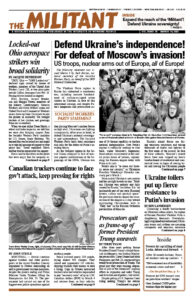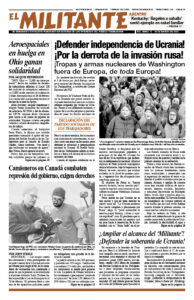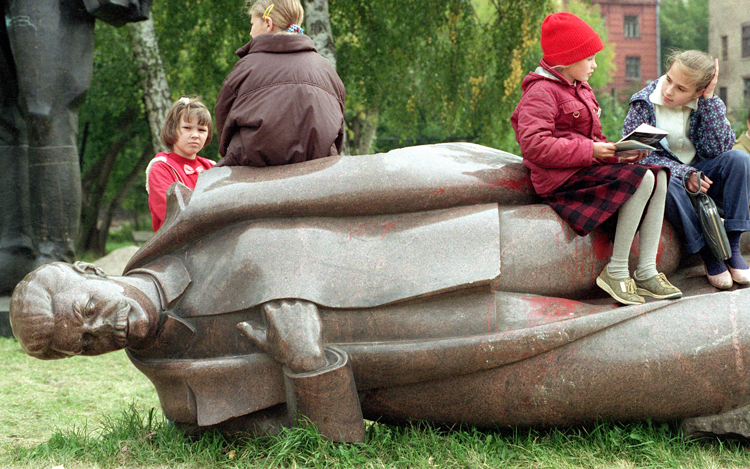To help explain what led to Moscow’s invasion of Ukraine, this special feature has excerpts from “Their Transformation and Ours,” a Socialist Workers Party resolution adopted in 2005 and “Capitalism’s Long Hot Winter Has Begun.” Both articles appear in New International no. 12.
Since 1991 when Stalinist governments disintegrated across the Soviet Union and Eastern Europe, the world imperialist disorder has grown. The U.S. rulers had relied on these police-state regimes to keep working people there out of politics.
For years Washington acted on the illusion that it won the Cold War and could use its military power without facing any serious challenge. The international communist movement led by the SWP was alone in explaining that U.S. imperialism had, in fact, lost the Cold War. Now the gravest war on the European continent in decades shows the destabilizing results of that reality. Copyright © 2005 by New International. Reprinted by permission.
* * *
“The underlying contradictions of world capitalism pushing toward depression and war did not begin on September 11, 2001. Some were accelerated by those events, but all have their roots in the downward turn in the curve of capitalist development a quarter century ago, followed by the interrelated weakening and then collapse of the Stalinist apparatuses in the Soviet Union and across Eastern and Central Europe at the opening of the 1990s. … One of capitalism’s infrequent long winters has begun. With the accompanying acceleration of imperialism’s drive toward war, it’s going to be a long, hot winter.”
— Capitalism’s Long Hot Winter Has Begun
Jack Barnes, July 2002
In face of the rulers’ mounting financial and economic vulnerability, the political and military challenges they confront worldwide, and the inevitable sharpening of class conflict these conditions entail, America’s propertied families and their political representatives in both the Democratic and Republican parties have become increasingly conscious of the need to use both the economic and the military power of U.S. imperialism. Gone is the illusion that the outcome of the Cold War in itself was a victory that would bring global stability under the domination of a Pax Americana, together with a cushion in state finances provided by a permanent “peace dividend.” The rulers sense — even if they do not see clearly or understand — the uncontrollable forces carrying them toward a future of sharpening crises, with its intertwined faces of depression, war, and increasingly violent class battles with higher and higher stakes.
The frustration born of a vague but growing awareness of this vulnerability, combined with the inability to find a self-confident course to decisively surmount it (there is none), is the single greatest source of the deepening factionalism, demagogy, and degradation of political discourse — what can accurately be called its “pornographication” — that characterize all bourgeois politics in the United States, not only between but increasingly within the dominant ruling parties and their peripheries. …
Neither NATO, an alliance born of the Cold War, nor the coalitions Washington patched together in the 1990s under UN or NATO fig leaves to fight wars in the Gulf and Yugoslavia, can serve the evolving purposes of U.S. imperialism. Nor can the coalition that was put together — or better, declared —to support the Anglo-American war against Saddam Hussein’s Baathist apparatus.
As the U.S. government prepares to engage battles around the world that it won’t be able to avoid (and in its majority no longer wants to avoid), in each and every case Washington’s armed forces command will be the centerpiece. “The mission will define the coalition,” not vice versa, in Rumsfeld’s words. …
Bush’s offer to Russia’s President Vladimir Putin is straightforward: “Don’t take your eyes off China! Come in under the shield. Accept the loss of your former Soviet republics. And when you run into real trouble with your own workers, peasants, and oppressed nationalities, the U.S. armed forces will be there to help.” The faint undertone saying “until we can replace you,” however, makes negotiations with Moscow rocky going.
U.S. imperialism’s objective in the Cold War was to ensure that in bringing down the regime in the Soviet Union, they would defeat the working class and its toiling allies on the land. The imperialist powers assumed that in doing so they could move rapidly toward establishing the bourgeois class relations, legal structure, and other preconditions for a stable capitalist Russia.
The imperialist rulers lost, however. The heirs of Stalin were felled, but the war with the working class has yet to be joined. Washington’s military transformation is aimed at preparing for that war. The “cooperative security locations” from one end of the Silk Road to the other, the bases that will eventually be negotiated in Belarus following those in Bulgaria and Romania, the lily pads in Ukraine, even refueling rights in Russia — all that is, or will be, on the table. As will the offer to Moscow that when civil strife threatens to spread “terrorism,” “drug wars,” or “nuclear proliferation,” the U.S. military will be there to prop up Moscow’s wretched declining armed forces against the workers and peasants — as well as, Putin hopes forlornly, against bourgeois-democratic oppositions both inside Russia and along its retrenched borders. However, neither experiences in the former Soviet republic of Georgia at the opening of 2004, nor in Ukraine a year later, bode well for these illusions.


